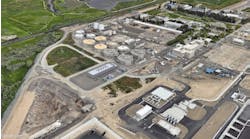California plans to offer grants totaling $47 million to encourage creation of ‘advanced energy communities,’ places where electricity demand is met through efficiency, renewable energy, and storage.
The California Energy Commission described the program in a draft solicitation scheduled for release in October.
Advanced energy communities achieve net zero energy with on-site renewables in a defined geographic area. They improve grid reliability and resiliency with technologies like energy storage, and help avoid construction of new transmission and distribution. The communities can be replicated or scaled to drive down costs.
Advanced energy communities also are economical: they provide affordable renewables and energy efficiency, and create a financially attractive market for developers, home owners and renters.
The draft solicitation requires that the communities be located in the service territories of California’s three major investor owned utilities, and serve disadvantaged communities or involve infill or greenfield development.
Any public or private entity may apply except for publicly owned utilities. Project teams must include one or more local city or county government located in the same geographic region. Other team members might include building developers, property managers, real estate agents, technology vendors, utilities and financiers.
Money will be awarded in two phases; the first will be for planning and permitting and the second for community build-out.
The funds will come from California’s electric program investment charge, or EPIC, a surcharge paid by electric utility customers of Pacific Gas and Electric, San Diego Gas and Electric, and Southern California Edison.
Communities aren’t required to offer matching funds, but those that do will receive additional points in the competition.
The deadline for proposals will be January 2016 for Phase 1 and June 2018 for Phase 2, under a schedule outlined in the draft solicitation.
The commission is seeking comments on the proposal by Friday August 14, 2015. Comments can be emailed to [email protected].
The draft solicitation is available here.
Track news on California’s advanced energy communities. Subscribe to the free Microgrid Knowledge newsletter.







